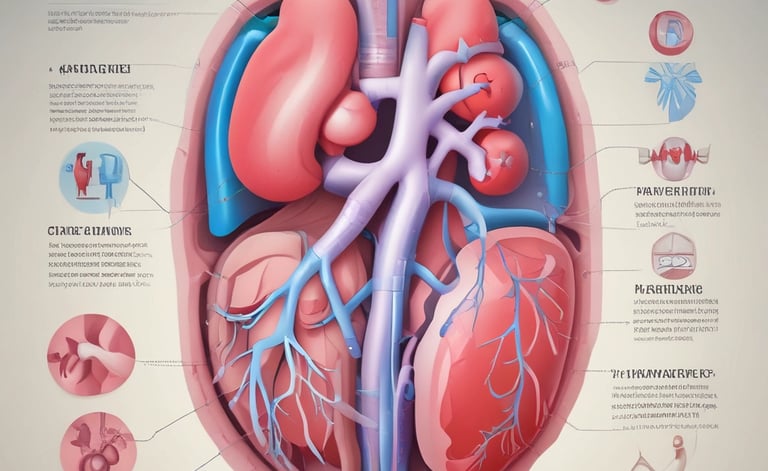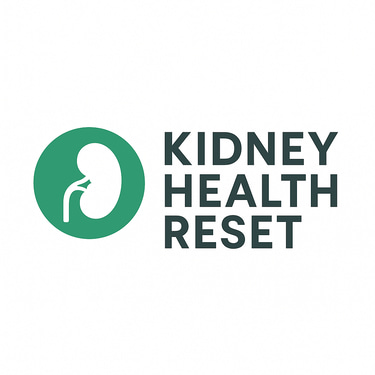Signs Your Kidneys Are Overworked (And What to Do About It)
6/14/20255 min read
Understanding Kidney Function
The kidneys are essential organs that perform a multitude of critical functions in maintaining overall health. Primarily, they are responsible for filtering waste products and excess substances from the blood, which are then excreted through urine. This filtration process not only eliminates toxins but also regulates the levels of various electrolytes such as sodium, potassium, and calcium. By maintaining a proper balance of these electrolytes, the kidneys play a key role in bodily functions that are crucial for survival.
Moreover, the kidneys contribute significantly to the regulation of blood pressure. They achieve this through the renin-angiotensin-aldosterone system, which controls fluid balance and pressure within the circulatory system. If the kidneys detect changes in blood volume or pressure, they can release hormones that either retain water and sodium or promote their excretion. This delicate balance is vital for ensuring that essential organs receive adequate blood flow and nutrients.
In addition to these primary functions, the kidneys are involved in the production of hormones that influence red blood cell production and bone health. For instance, erythropoietin is a hormone produced by the kidneys that stimulates the bone marrow to produce red blood cells, while calcitriol, the active form of vitamin D, facilitates calcium absorption from the gut. Therefore, the kidneys play an integral role in not only detoxifying the body but also promoting overall homeostasis.
However, when the kidneys are overworked—often due to factors such as dehydration, excessive protein intake, or underlying health conditions—they can become less efficient. This inefficiency can lead to a build-up of toxins in the body, electrolyte imbalances, and potentially serious health issues. It is crucial to recognize the signs of overworked kidneys, as early intervention can prevent further complications and support overall kidney health.
Common Signs of Overworked Kidneys
The kidneys are essential organs tasked with filtering waste products from the blood and regulating fluid balance. When they become overworked, they may exhibit a variety of symptoms that warrant attention. It is crucial to recognize these signs early to ensure proper kidney health and overall well-being.
One of the most common indications of overworked kidneys is fatigue. When the kidneys struggle to perform their functions efficiently, the body's waste products can accumulate, leading to feelings of exhaustion and reduced energy levels. If an individual finds themselves constantly tired despite adequate rest, it may be indicative of kidney distress.
Swelling or puffiness in areas such as the feet, ankles, or face can also signal kidney issues. The kidneys regulate fluid levels in the body; hence, when they are overworked, they may struggle to remove excess fluid, causing edema. This swelling is not only uncomfortable but can also reflect underlying problems in kidney function.
Back pain is another potential symptom to consider, especially if it is localized in the area near the kidneys, known as the flank. While back pain is not exclusively linked to kidney problems, if it occurs persistently alongside other symptoms, it may warrant further investigation. Flank pain can arise from conditions such as kidney stones or infections.
Lastly, changes in urine output or color can serve as important warning signs. Reduced urine output, or conversely, an increase in urination frequency, may point to kidney dysfunction. Additionally, urine that appears darker or contains blood can indicate potential issues with the kidneys or urinary tract. Regular monitoring of these changes can provide critical insight into kidney health.
In summary, being vigilant about these common signs of overworked kidneys—fatigue, swelling, back pain, and changes in urinary patterns—can play a significant role in identifying kidney health problems early. Prompt attention to these symptoms can lead to timely intervention and treatments that promote kidney function and overall health.
Risk Factors That May Lead to Kidney Overwork
The kidneys play a vital role in the body's overall health, primarily through the filtration of blood and the removal of waste products. However, certain risk factors can lead to increased strain on these essential organs, potentially resulting in significant health issues.
One of the most prevalent risk factors contributing to kidney overwork is high blood pressure, also known as hypertension. When blood pressure remains elevated over time, it can lead to damage to the blood vessels within the kidneys. This impairment can hinder their ability to properly filter blood, leading to a cascade of complications. Individuals with uncontrolled hypertension are thus at an increased risk of developing chronic kidney disease.
Diabetes is another significant factor that can overwhelm the kidneys. High blood sugar levels, if not properly managed, can lead to diabetic nephropathy, a condition characterized by damage to the kidneys' filtering units. Maintaining stable blood sugar levels through diet, exercise, and medication is essential for those at risk of kidney complications due to diabetes.
Dehydration is often overlooked but poses a considerable risk to kidney health. When the body lacks adequate fluid intake, it can lead to concentrated urine and increased stress on the kidneys. It is essential to stay adequately hydrated, especially during hot weather or strenuous activities, to ensure optimal kidney function.
Furthermore, excessive alcohol consumption can significantly contribute to kidney strain. Alcohol is a toxin that the body must work to eliminate, placing undue stress on the kidneys. Moderating alcohol intake is crucial for maintaining kidney health and preventing overwork.
Lastly, poor dietary choices can result in an imbalance of nutrients that the kidneys must process. A diet high in processed foods, salt, and unhealthy fats can contribute to kidney damage over time. Adopting a balanced diet that includes ample fruits, vegetables, and whole grains can greatly reduce the risk of kidney-related issues.
Steps to Support Kidney Health
Supporting kidney health is vital for overall well-being, and there are several actionable steps that individuals can take to promote optimal kidney function. One of the most important factors is proper hydration. Drinking sufficient water throughout the day helps to flush toxins from the kidneys, aiding in their filtering capabilities. It is generally recommended to aim for at least eight 8-ounce glasses of water daily; however, individual needs may vary based on activity level and climate.
Another fundamental aspect of kidney support is adhering to a balanced diet. A dietary plan rich in fruits, vegetables, whole grains, and lean proteins can provide essential nutrients while minimizing the intake of harmful substances. Reducing sodium and processed foods is advisable, as high salt consumption can stress the kidneys over time. Incorporating kidney-friendly foods such as berries, leafy greens, and fatty fish can also be beneficial.
Regular physical activity further contributes to maintaining kidney health. Engaging in moderate exercise such as walking, cycling, or swimming for at least 30 minutes several times a week not only aids in weight management but also enhances blood circulation and reduces blood pressure. This can subsequently lower the risk of developing chronic kidney disease.
Furthermore, it is imperative to monitor kidney function regularly, particularly for individuals at higher risk, such as those with diabetes or hypertension. Regular check-ups with healthcare professionals can provide essential insights into kidney health and allow for any necessary interventions to prevent complications. Keeping track of blood pressure and blood sugar levels can also play a significant role in preserving kidney function.
By prioritizing hydration, nutrition, physical activity, and health monitoring, individuals can take significant strides toward supporting and maintaining optimal kidney health.


